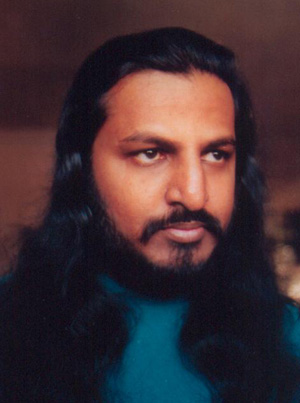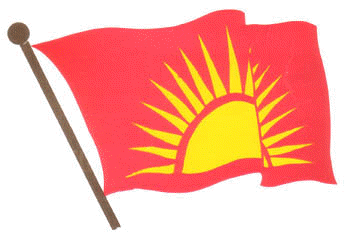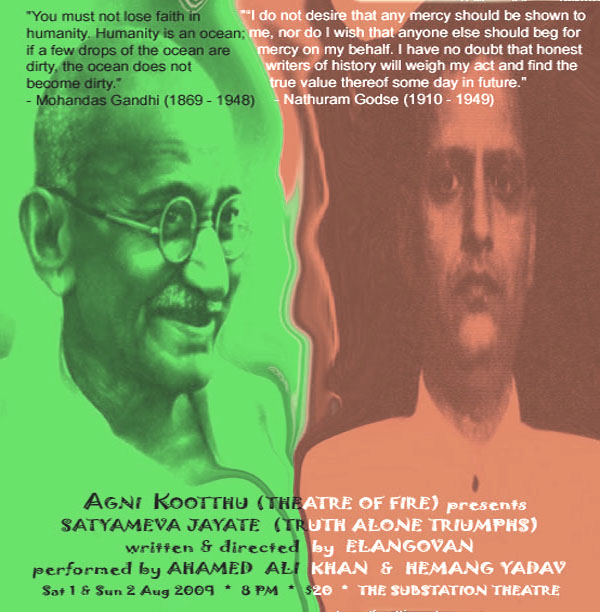 ELANGOVAN, bilingual poet-playwright-director, screenwriter, literary editor,
transcreator, and pioneer of modern Tamil poetry and Tamil experimental theatre
in Singapore, obtained a BA (Western Australian Academy of Performing Arts) and
a MA (Middlesex University, UK) in Theatre Directing. He has been a
freelance-journalist, teacher, television film-cameraman (then Singapore
Broadcasting Corporation), Welfare Officer (closed institution for delinquents),
Probation Officer and Prison Welfare Officer. He worked as an Arts Administrator
with the National Arts Council from 1987 to 2000, Lecturer (Drama) at the
Division of Performing Arts, LASALLE-SIA College of the Arts from 2001 to 2003,
an Associate (Literary) at The Centre for the Arts, National University of
Singapore in 2004, a Security Executive, from 2005 to 2006, a Drama Teacher at
an international school in 2007, and an Administrative Manager in 2008. He is
the Artistic Director of Agni Kootthu (Theatre of Fire).
ELANGOVAN, bilingual poet-playwright-director, screenwriter, literary editor,
transcreator, and pioneer of modern Tamil poetry and Tamil experimental theatre
in Singapore, obtained a BA (Western Australian Academy of Performing Arts) and
a MA (Middlesex University, UK) in Theatre Directing. He has been a
freelance-journalist, teacher, television film-cameraman (then Singapore
Broadcasting Corporation), Welfare Officer (closed institution for delinquents),
Probation Officer and Prison Welfare Officer. He worked as an Arts Administrator
with the National Arts Council from 1987 to 2000, Lecturer (Drama) at the
Division of Performing Arts, LASALLE-SIA College of the Arts from 2001 to 2003,
an Associate (Literary) at The Centre for the Arts, National University of
Singapore in 2004, a Security Executive, from 2005 to 2006, a Drama Teacher at
an international school in 2007, and an Administrative Manager in 2008. He is
the Artistic Director of Agni Kootthu (Theatre of Fire).
He has published three collections of poetry: Vizhichannalkalin Pinnalirunthu
(Behind Windows of Eyes), 1979, Mounavatham (Silent Annihilation), 1984, and
Transcreations (a bilingual collection), 1988, and eleven collections of plays,
DOGS and Other Plays, 1996, TALAQ (Divorce), 1999, BUANG SUAY and Other Plays,
2001, FLUSH - recipient of the Singapore Internationale Award, 2002, MINES,
2003, OODAADI (Medium) - recipient of the Singapore Internationale Award, 2003,
O$P$ (OweMoneyPayMoney), 2004, 1915 - recipient of the Singapore Internationale
Award, 2005, SMEGMA, 2006, P (Shit), 2007, and I, BOSE, 2009.
His works have been anthologized in The Poetry of Singapore (1985) and The
Fiction of Singapore (1990) in the Anthology of ASEAN Literatures series, and
ASEANO - An anthology of poems from Southeast Asia (1995), Philippines, Voices
of Singapore (1989), Words For The 25th (1990), Singapore: Places, Poems,
Paintings (1993), Journeys: Words, Home and Nation (1995), Rhythms-A Singaporean
Millennial Anthology of Poetry (2000), The S.E.A. Write Anthology of ASEAN Short
Stories & Poems (2008), and SAMPARK - Indian edition on Singapore literature
(2008). He was one of the literary editors of: SINGA - the journal of literature
and the arts in Singapore, from 1990 to 1993 and 1997 to 1998, The Fiction of
Singapore, Words For The 25th and Voices 4 (1995).
He has represented Singapore in the 2nd Asian Poetry Festival, Dhaka,
Bangladesh, 1989, 3rd & 4th Southeast Asian Writers’ Conferences in Singapore,
1987 and Philippines, 1990, 3rd World Poetry Reading, Malaysia, 1990, and 1st
ASEAN Writers’ Conference / Workshop, Malaysia, 1992, and was a member of the
first multilingual literary delegation’s trip to China in Apr 1999 organised by
The Centre For The Arts & The Association of Singapore Writers (Chinese). He
represented Singapore in the Singapore Writers Festivals in 1988, 1993 and 2005,
and the Ubud International Writers Festival, Bali, Indonesia in Oct 2005.
He has also conducted poetry and playwriting workshops and mentored for the
Creative Arts Programme series from 1991 to 1993, 1998, 1999 and 2004, organised
by the Gifted Education Unit of the Ministry of Education and The Centre for The
Arts, National University of Singapore. His bilingual poem Hairline was
displayed in the MRT: Poems on the Move series by the National Arts Council in
Jan 1999.
He wrote the story, screenplay and dialogues for the 13-week teledrama SOOR
(High) based on true drug-abuse case-studies in Singapore and it was telecasted
on Vasantham Central of the Television Corporation of Singapore (TCS) in 2003.
DOGS was staged by the Hearts & Eyes Theatre at the Standard Bank National Arts
Festival, Grahamstown, South Africa, Jul 1996. DOGS was given a staged reading
in the Typhoon III Festival at the Soho Theatre, London in Jun 2004, a rehearsed
reading at the Birmingham Repertory Theatre in Oct 2004 and staged in the
doublebill ‘Typhoon Live’ at the Oval House Theatre (Off West End), London from
9 to 13 Oct 2007 by the Yellow Earth Theatre - UK's flagship award-winning East
Asian theatre company based in London. P (SHIT) was staged by Teater Ekamatra, a
leading Malay theatre group in Singapore, Mar 2006.
Since 1991, he has written, adapted, transcreated and directed numerous plays
for Agni Kootthu (Theatre of Fire), a prominent bilingual exploratory theatre
group in Singapore. His major unpublished plays include Becak (Trishaw) Puli
(Tiger), Sangre (Blood), Mirugam II (Animal II), Buddha’s Handgrenade, OH! and
Alamak! His works have been staged in Australia, UK, South Africa, Spain and
India. He has also participated as a Dramaturg: MOSAIC Youth Theatre of Detroit,
USA, Dec 2000, UNESCO International Theatre Festival, Sinaia, Romania, Jul 2001,
and at the FIESTA! International Experimental Theatre Festival, Dec 2001,
Caracas, Venezuela.
Known to be controversial, irreverent, and provocative, his critical works
explore the untouched realities in Singapore. He believes that art should
conscientise, confront and question accepted societal stereotypes of vision,
perception, feeling and judgement to examine reality as a historical and social
process.
Elangovan is listed on tamilnation.org as one of the renowned individuals in
their list of 100 Tamils of the 20th Century - Tamils who had made significant
contributions to the world. He is listed in the
language
and literature category among other prominent Tamil
intellectuals.
He received the 1997 SEA (South-East Asia) Write Award, Southeast Asia’s premier
literary prize, in Bangkok, Thailand for his bilingual contribution to
literature (poetry) and theatre in Singapore.
" 'Satyameva Jayate' ( सत्यमेव जयते) (Sanskrit: "Truth Alone Triumphs") is the national motto of India. It is inscribed in Devanagari script at the base of the national emblem, which is an adaptation of the Lion Capital of Asoka at Sarnath, near Varanasi in the north Indian state of Uttar Pradesh. The origin of the motto is a well-known mantra 3.1.6 from the mundaka Upanishad Full mantra as follows.
satyameva jayate nānrtam


